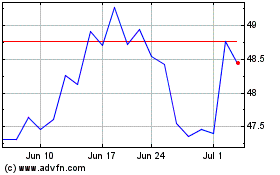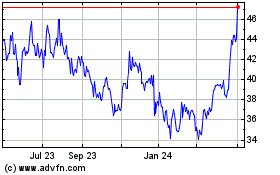By Paul Ziobro
President Biden revoked a Trump-era attempt to ban Chinese-owned
apps TikTok and WeChat, instead implementing an executive order to
broadly review whether apps controlled by foreign adversaries pose
a security threat to the U.S.
The June 9 order means that the future of the popular apps
remains unsettled as they undergo a review by the Commerce
Department. Other foreign-owned apps are expected to face similar
scrutiny.
It represents a twist in the saga around the ownership of
TikTok, which allows users to watch and share bite-size video
clips. During the Trump administration, U.S. officials expressed
concerns that data collected by TikTok could be shared with China's
authoritarian government and tried to force the sale of the company
to a U.S. buyer. TikTok has said that it never would share data on
U.S. users with China's government.
Here is a look at key developments.
What does President Biden's executive order do?
The order launches a review of a broader universe of
foreign-owned apps over potential security concerns. It is designed
to replace the Trump administration's approach that targeted
individual companies, which senior Biden administration officials
said were effectively unenforceable.
Instead of reviewing specific apps, the order calls for a study
of any apps developed or owned by people or companies "subject to
the jurisdiction of a foreign adversary, including the People's
Republic of China," according to a White House fact sheet. That
could lead to an even broader crackdown on foreign-owned companies
than the Trump administration sought.
The order allows 60 days for the director of national
intelligence and Homeland Security secretary to provide threat and
vulnerability assessments regarding certain apps to the Commerce
Department and 120 days to produce a report with recommendations.
Within 180 days, the commerce secretary is supposed to recommend
other executive and legislative actions that could be taken to
address any risks.
What is the U.S. concerned about?
U.S. officials worry that the data harvested by such apps could
be shared with foreign governments, which could then use it to
undermine U.S. security interests. Some officials are concerned
that the Chinese government is potentially building a vast database
of information that could be used for espionage, for instance, by
identifying U.S. government employees who might be susceptible to
blackmail.
Officials at companies including TikTok parent ByteDance Ltd.
and WeChat parent Tencent Holdings Ltd. have disputed security
concerns alleged by some U.S. officials. Both companies have said
they protect the privacy of their users.
What happened to the sale of TikTok?
The Biden administration shelved a potential sale of TikTok's
American operations to an investor group that included Oracle Corp.
and Walmart Inc., The Wall Street Journal reported in February,
citing people familiar with the matter. The delay was part of plans
to conduct a broader review of how the prior administration
approached the potential security risks from Chinese tech
companies.
Concerns about a potential U.S. ban of TikTok last year, in
part, drove discussions for ByteDance to explore a deal. The ban
threat, combined with executive orders from former President Donald
Trump to force a sale, facilitated a bidding process won by the
group led by Oracle and Walmart.
Any deal involving the video-sharing app would likely be
different from the one discussed in September, people familiar with
the matter have said, and any sale would require Chinese regulatory
approval.
What kind of user data does TikTok collect?
If you use TikTok, the app collects a range of information such
as location data and your internet address, according to its
privacy policy, and it tracks the type of device you are using to
access its platform. It stores your browsing and search history as
well as the content of messages you exchange with others on the
app. It may also collect biometric information, such as faceprints
and voiceprints.
If you opt in, TikTok says it can collect your phone and
social-network contacts, your GPS position and your personal
information such as age and phone number along with any
user-generated content you post, such as photos and videos. It can
store payment information, too. TikTok also gets a sense of what
makes you tick. It can track the videos you like, share, watch all
the way through and re-watch.
Other social-media platforms such as Facebook and Twitter also
collect large amounts of information about users. But TikTok is
facing scrutiny because Chinese apps in particular have a
reputation for grabbing more data than required to provide their
services, often sending information to advertising networks, said
Jon Callas, a senior technology fellow with the American Civil
Liberties Union. "Chinese apps are frequently far more abusive than
others -- and we hate the others," he said.
In 2020, the Journal found that TikTok had skirted a privacy
safeguard in Google's Android operating system to collect unique
identifiers from millions of mobile devices. This data allowed the
app to track users online without allowing them to opt out.
How secure is TikTok?
Like other popular apps, TikTok has had security problems. In
December, researchers at the security firm Check Point discovered a
number of bugs in TikTok that could allow hackers to upload or
delete videos from user accounts and gain access to personal
information such as email addresses. Those bugs have now been
fixed, TikTok says.
Also, last year TikTok was one of dozens of iPhone apps that
accessed data copied into smartphone clipboards without users'
consent, a practice that could give the app access to sensitive
information -- copied phone numbers or passwords, for example.
TikTok has said the data access was part of an anti-spam feature
and that no such information left users' devices, adding that it
had removed that tool.
Other researchers have found that TikTok doesn't pose a threat
to national security. In March, researchers from a University of
Toronto cybersecurity group called Citizen Lab released a report
that found no evidence of "overtly malicious behavior" in TikTok's
underlying code. The researchers found that the algorithms used by
the app are no more intrusive than Facebook when it comes to data
collection. However, the researchers warned there could be other
security issues they didn't find and noted the Chinese government
could use methods to force ByteDance to hand over data under
national security laws.
Are U.S. concerns about TikTok new?
No. The app has been under a national-security review by the
Committee on Foreign Investment in the U.S. Some lawmakers in 2019
called for a review of TikTok amid concerns of the potential for
Chinese intelligence services to spy on users or conduct
foreign-influence campaigns through the platform. TikTok has denied
these allegations.
Other apps have prompted U.S. security concerns as well.
National-security officials in 2019 ordered a Chinese company to
sell gay-dating app Grindr, citing the risk that the personal data
it collects could be exploited by Beijing to blackmail people with
security clearances. Authorities last year approved the app's sale
to an investor group
Why does TikTok need the information it gathers?
TikTok says it collects the data to improve the app's user
experience, including by customizing content and providing
location-based services. The data is also collected to inform its
algorithms, and to tailor which ads the app serves to its users.
TikTok says the platform will store your information for as long as
it is necessary to provide the services to you.
TikTok says it stores its data on American users on servers in
the U.S. and Singapore, but its website says that information can
be shared with ByteDance or other affiliates. In a blog post from
April of last year, TikTok's chief information security officer,
Roland Cloutier, said the company was working on "limiting the
number of employees who have access to user data and the scenarios
where data access is enabled."
What happens to your data if you quit TikTok?
After a user quits the app, the information is stored in what
the company says is an aggregated and anonymized format. Users can
ask TikTok to delete their data, and the company has said in its
policy that it will respond in a manner consistent with applicable
law upon verifying your identity.
Write to Paul Ziobro at Paul.Ziobro@wsj.com
(END) Dow Jones Newswires
June 10, 2021 16:34 ET (20:34 GMT)
Copyright (c) 2021 Dow Jones & Company, Inc.
Tencent (PK) (USOTC:TCEHY)
Historical Stock Chart
From Jun 2024 to Jul 2024

Tencent (PK) (USOTC:TCEHY)
Historical Stock Chart
From Jul 2023 to Jul 2024
